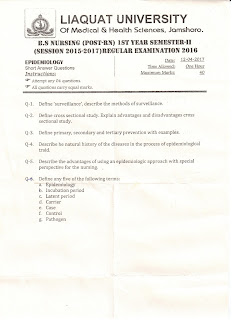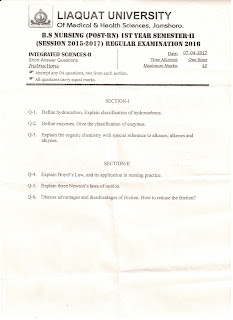LUMHS Past PaperS OF POST RN BSN NURSING Semester II
lUMHS Past papers of Post RN BSN Nursing First year Semester-II held in April-2017 of Session 2015-2017 as a Regular examination 2016
from LIAQUAT UNIVERSITY OF MEDICAL & HEALTH SCIENCE, JAMSHORO
YEAR – I
Semester – II
1. Advance Nursing Concept – II | BSN Past Paper Year – 2017
BScN NURSING (POST-RN), FIRST YEAR, SEMESTER-II
(SESSION
2015-17) REGULAR EXAMINATION 2016
ADVANCE
NURSING CONCEPT-II
Short Answer Questions
Instructions:
|
Date: 06-04-2017
Time Allowed: One Hour
Maximum Marks: 40
|
·
Attempt any 04
questions.
·
All questions
carry equal marks.
Q.1.
What is CA
bladder & its causes? Write the alteration in the bladder functions due
to CA
& management of CA bladder patients.
Q.2.
Write down the
nursing intervention of patient with angina?
Q.3.
List down the
difference between acute and chronic renal failure.
Q.4.
Write the
pathophysiology of MI with its sign and symptoms and first line
treatment in
the emergency room.
Q.5.
Describe pathophysiology
of osteoarthritis, list the diagnostic criteria, clinical
features of osteoarthritis.
Q.6.
Define peptic
ulcer, its causes, sign and symptoms, medical and nursing management.
2. Epidemiology | BSN Past Paper Year – 2017
BScn NURSING (POST-RN), FIRST YEAR, SEMESTER-II
(SESSION
2015-17) REGULAR EXAMINATION 2016
EPIDEMIOLOGY
Short
Answer Questions
Instructions:
|
Date: 12-04-2017
Time Allowed: One Hour
Maximum Marks: 40
|
·
Attempt any 04
questions.
·
All questions
carry equal marks.
Q.1.
Define ‘surveillance’,
describe the methods of surveillance.
Q.2.
Define cross
sectional study. Explain advantages and disadvantages cross
sectional study.
Q.3.
Define primary,
secondary and tertiary prevention with examples.
Q.4.
Describe the
natural history of the disease in the process of epidemiological traid.
Q.5.
Describe the
advantages of using an epidemiological approach with special
perspective for the nursing
Q.6.
Define any FIVE
of the followings:
a.
Epidemiology
b.
Incubation period
c.
Latent period
d.
Carrier
e.
Case
f.
Control
g.
Pathogen
3. Integrated
Sciences – I
BScN NURSING (POST-RN), FIRST YEAR, SEMESTER-II
(SESSION
2015-17) REGULAR EXAMINATION 2016
INTEGRATED
SCIENCE-II
Short Answer Questions
Instructions:
|
Date: 07-04-2017
Time Allowed: One Hour
Maximum Marks: 40
|
·
Attempt any 04
questions.
·
All questions
carry equal marks.
SECTION-I
Q.1.
Define
hydrocarbons. Explain classification of hydrocarbons.
Q.2.
Define enzymes. Give
the classification of enzymes.
Q.3.
Explains the
organic chemistry with special reference to alkanes, alkenes and alkynes.
SECTION-II
Q.4.
Explain Boyel’s
Law, and its application in nursing practice.
Q.5.
Explain three
Newton’s laws of motion.
Q.6.
Discuss advantages
and disadvantages of friction. How to reduce the friction?
4. Community Health Nursing | BSN Past Paper Year – 2017
BScN NURSING (POST-RN), FIRST YEAR, SEMESTER-II
(SESSION
2015-17) REGULAR EXAMINATION 2016
COMMUNITY
HEALTH NURSING
Short Answer Questions
Instructions:
|
Date: 10-04-2017
Time Allowed: One Hour
Maximum Marks: 40
|
·
Attempt any 04
questions.
·
All questions
carry equal marks.
Q.1.
Discuss the
development of community health nursing.
Q.2.
Define
occupational health, what do you know about occupational hazards.
Q.3.
Differentiate
between community health nursing and public health nursing.
Q.4.
Discuss the
causes of maternal mortality.
Q.5.
List the causes
high growth rate of Pakistan.
Q.6.
Attempt any two
of the followings:
a.
Epidemiologic
process
b.
Occupational
hazard
c.
Health educator
d.
Basic health
unit
e.
Millennium development
goals
BScN NURSING (POST-RN), FIRST YEAR, SEMESTER-II
(SESSION
2015-17) REGULAR EXAMINATION 2016
INTRODUCTION
TO MANAGEMENT
Short Answer Questions
Instructions:
|
Date: 14-04-2017
Time Allowed: One Hour
Maximum Marks: 40
|
·
Attempt any 04
questions.
·
All questions
carry equal marks.
Q.1.
Discuss basic
functions of the modern management.
Q.2.
What are the
leadership styles?
Q.3.
Describe the
managerial skills of a good manager.
Q.4.
List techniques
for conflict resolution and its management.
Q.5.
What is
supervision, list basic skills needed for a good supervision?
Q.6.
Describe any two
of the following.
a.
Centralized
& decentralized structure.
b.
Functional &
divisional structure.
c.
Recruitment,
selection and orientation.
6.
Fundamentals of
Counseling and Guidance |BSN Past Paper Year – 2017
BScN NURSING (POST-RN), FIRST YEAR, SEMESTER-II
(SESSION
2015-17) REGULAR EXAMINATION 2016
FUNDAMENTAL
OF COUNSELING & GUIDENCE-II
Short
Answer Questions
Instructions:
|
Date: 11-04-2017
Time Allowed: One Hour
Maximum Marks: 40
|
·
Attempt any 04
questions.
·
All questions
carry equal marks.
Q.1.
What is the
difference between guidance and counseling?
Q.2.
Enlist
principles of Do’s and Don’ts of counseling.
Q.3.
What are the
problems and issues faced by nursing students in hospitals? Briefly
describe any
two of the following.
Q.4.
Draw the Johari
Window
Q.5.
Discuss the
importance of verbal and nonverbal communication in nursing.
Q.6.
What are most
common characteristics of middle age school children.
7. English – I
B.SC. NURSING (POST-RN), FIRST YEAR, SEMESTER-II
(SESSION
2015-17) REGULAR EXAMINATION 2016
ENGLISH-II
Instructions:
|
Date: 14-04-2017
Time Allowed: One Hour
Maximum Marks: 40
|
Attempt any five questions including question no. 1
which is compulsory
Q.1.
People have used
pigeons to carry messages to one another for hundreds of years. In the 12th
century, the royal placed of Iraq and Syria included pigeon houses so the kings
could be kept informed of their generals, victories and defeats on the
battlefield. In fact, pigeons were a common way to send messages right up
through World War II. In 1815 an English banker named Nathan Rothschild made
his fortune by relying on messages sent to him by carrier pigeons. English
troops were fighting Napoleon’s Forces in France, and the English were believed
to be losing. A financial panic gripped London. Government bond were offered at
low prices. Few people noticed that Rothschild was snapping up these bonds when
everyone else was desperately trying to sell them. A few days later, London
learned the truth; the Duke of Wellington had defeated Napoleon at the battle
of Waterloo. The value of the bonds soared, and Rothschild became fabulously
wealthy… All because his pigeons had brought him news of the victory before
anyone else knew of it.
Most of the time,
however, carrier pigeons were used to benefit an entire country, not just one
individual. The United States, England, France, Germany, and Italy, in both
World War I and War II used carrier pigeons. Not only were the birds often the
fastest, most reliable way to send messages, they could also be used to reach soldiers
far behind enemy lines, where radios and field telephone lines were useless.
Since they could easily be 3,000 soldiers and 150 officers were needed to care
for train the tens of thousands of birds in the U.S. Pigeon Service. Carrying
messages could be a dangerous job. Some pigeons performed with such bravery
that they became famous and were even awarded medals, such as England’s Dicken
Medal of Gallantry. In a few cases, pigeons even became prisoners of war. In
1918 American forces captured a pigeons named the Kaiser, which had been
trained to fly special missions for Germany, during battle. He was taken to
America, where he lived to the age of 32.
The most famous pigeon
of all may have been Cher Ami, Stationed in France during World War I, he carried
twelve important messages for American forces. On his last mission through
wounded, he carried a message that saved the lives of 194 American soldier. For
his extraordinary service, he was awarded the French “Croix de Guerre”. Carrier
pigeons area slightly different breed from the kind of pigeon you see on city
streets. They are much thinner and taller, with longer legs. Many people find
carrier pigeons often enjoy this odd appearance and consider carriers the best
of their bred.
Today. Modern communication
method can carry information from one place to another hundreds of times faster
than a pigeon could do it. However, few people would argue with the fact that
carrier pigeons especially those that served in the military – have earned
their place in history. Stories about brave pigeons such as Cher Ami, President
Wilson and Colonel’s Lady have the power to inspire us as no fax machine or
high-speed internet connection could over do.
a.
How many pigeons
are named in the text, what are their names?
b.
“Croix de Guerre”
Was awarded to which pigeon?
c.
Nathan
Rothschild was earning his livelihood by?
d.
How old was the
Kaiser when he died?
Q.2.
Write an easy on
one of the following topics.
a.
Value of science
in everyday life.
b.
Uses and abuses
of internet.
c.
Nurse angle or
devil.
d.
My ideal of
happy life.
Q.3.
Do as directed:
a.
She says, “She
is working hard”. (Change
into indirect speech)
b.
The teacher
said, “do not be noisy”. (Change
into indirect speech)
c.
I said that I
had not been in the class. (Change
into indirect speech)
d.
My dog was being
beaten by the man. (Make
active)
e.
He could not be
hit the ball. (Make
passive)
Q.4.
Choose the
correct one from the given options:
i.
Almost everyone _________________
heard of them.
a)
Has b) Have c)
having d) done
ii.
Where are planning
to go to ________________ Spain ________________
England during
the holydays.
a)
Either…nor b) either…or c)
nether…and d) both…nor
iii.
The sentence
that states the main idea is called ____________________.
a)
Supporting
detail b) Transitional sentence c) Thesis
statement
d) Plan of
Development
iv.
Plays were a
popular form of entertainment in Shakespeare’s time: __________________ they
Continue to be
popular form of entertainment today.
a)
However b) while c) as d) because
v.
An effective
paragraph or easy:
a)
Makes a point b) Provides specific support c) a & b
d) Does none
of the above
Q.5.
Define the
following terms (any three) with at least two examples each:
a.
Run-on sentence
b.
Subject-verb
agreement
c.
Fragment
d.
Parallel structure
e.
Misplaced
modifier
f.
Dangling modifier
Q.6.
Change the
following into passive voice
a.
people speak
English in England
b.
We must learn
our lesson
c.
They will watch
a good movie
d.
Let’s eat some
fruit
e.
We can change
the circumstances of Pakistan.
Q.7.
What do you
feel, is the purpose of medical school?
Q.8.
Write an easy on
one of the following topics.
a.
Value of science
in everyday life.
b.
Injustice in
nursing profession.
c.
Beggary in the
cities of Sindh.
d.
My ideal of
happy life.
Please send scan copy of any past paper of BSN Nursing to help your fellow nurses or student nurses.
POST RN BSN, BSN nursing, BSN, RN to BSN, POST RN BSN, Generic BSN, LUMHS nursing, Post RN BS Nursing, BScN, BSN Past Papers, BSN Nursing notes, nursing, Registered nurse, nurse | BSN Past Papers Semester 2 Year – 2016
LUMHS Past Papers BSN Semester 2 | POST RN BSN NURSING RESOURCES

























1 Comments
I was diagnosed with Idiopathic Pulmonary Fibrosis (IPF) four years ago. For over two years, I relied on prescription medications and therapies, but unfortunately, the symptoms continued to worsen. My breathing became more laboured, and I experienced increasing fatigue and shortness of breath with even minimal activity.Last year, out of desperation and hope, I decided to try an herbal treatment program from NaturePath Herbal Clinic.Honestly, I was skeptical at first, but within a few months of starting the treatment, I began to notice real changes. My breathing became easier, the tightness in my chest eased, and I felt more energetic and capable in my daily life. Incredibly, I also regained much of my stamina and confidence. It’s been a life-changing experience I feel more like myself again, better than I’ve felt in years.If you or a loved one is struggling with IPF, I truly recommend looking into their natural approach. You can visit their website at www.naturepathherbalclinic.com
ReplyDelete